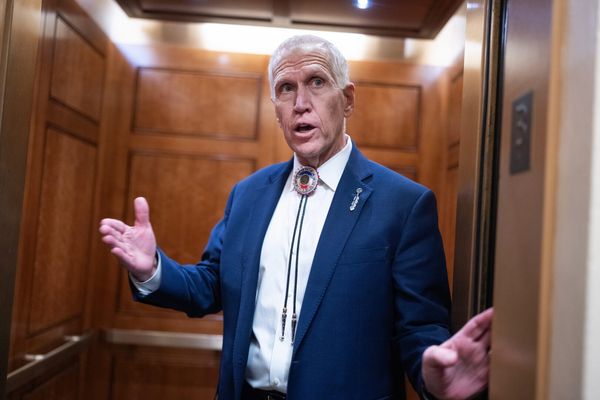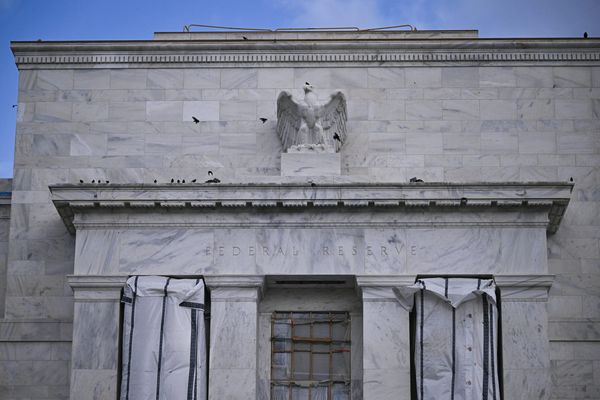
Joe Biden’s clean technology law has dragged the European Union into a subsidy fight that may trigger a transatlantic trade war, just as the allies are joining forces against Russia’s invasion of Ukraine.
The EU has always defended the global rules-based order, even as the US has grown increasingly hostile toward the constraints it adopted as a member of the World Trade Organization. But Biden’s $500 billion in new spending and tax breaks to boost domestic green industries over the next decade may prove to be the final straw.
The EU unveiled its Green Deal Industrial Plan this past week in an effort to accelerate the development of its clean technology sector through massive investment aid and tax credits. The European legislation is still being negotiated, but if it follows in the US footsteps it could make the WTO even less relevant.
With the US Inflation Reduction Act appearing to run afoul of international subsidy rules forbidding domestic content requirements, how the EU proceeds may leave the WTO, and the post-World War II system it represents, on the sidelines as the world’s economic superpowers embark on new era of confrontation with no holds barred.
“The big problem we have at the moment is that some of the instruments countries are using to fight climate change are contrary to the norms of international trade,” Arancha González Laya, former executive director of the International Trade Centre and former Spanish foreign affairs minister, said in an interview. “I am concerned that we are entering into a period where a new form of interdependence, which is climate change, will be tackled with purely nationalistic approaches.”
China’s Rise
The most recent phase of globalization accelerated in the 1990s following the disintegration of the Soviet Union and the spread of US-led trade values across the world. China’s entry into the WTO in 2001 helped supercharge the global economy by 76% over the following 20 years and raised some 1 billion people out of poverty. But the shock of China’s meteoric rise brought pain to foreign workers — particularly in regions with labor-intensive manufacturing like electronics, apparel, tires, steel and aluminum.
Former President Donald Trump blamed the WTO for failing to curb China’s worst trade abuses and policymakers in Washington broadly accept that the organization is unfit for purpose. As the US became disaffected with the trading system it developed, it caused disharmony between Washington and Brussels. Despite the WTO’s failings, the EU continues to defend the organization, which it sees as a critical bulwark against the return of the power-based trading system that preceded the second World War.

The EU has threatened to take the US to the WTO over the IRA, saying it discriminates against European producers with strict local content requirements. The trade regulator’s chief, Ngozi Okonjo-Iweala has urged the US and EU to settle their disagreement between themselves rather than drag the organization into a new trade dispute.
EU leaders will discuss a response to the American law this month, but some are confident that the bloc will make sure the policy is compliant with international trade rules. “The EU response will be targeted exactly at not damaging the global trade system,” said Simone Tagliapietra, a researcher at the Bruegel think-tank in Brussels.
EU Summit
“Should we be worried about this subsidy race? Yes, if the subsidies are duplicative and are absolute violations of WTO rules,” Jennifer Hillman, a Georgetown University professor and a former WTO appellate body member, said in an interview. ”But if done right we should be applauding them.”
But the 27-nation bloc is torn over how to respond and there’s internal strife that if the EU responds to the IRA with huge subsidies of its own, it would only benefit the larger member states.
The EU’s competition chief Margrethe Vestager has cautioned that too much national support for companies could disadvantage smaller and poorer countries that have less fiscal capacity. Germany and France, the EU’s two largest economies, have benefited the most after the commission, the EU’s executive arm, eased existing rules to help firms grapple with high energy costs.
Italian Prime Minister Giorgia Meloni was planning to warn German Chancellor Olaf Scholz ahead of the summit that — while the proposed EU roadmap was a good start — it was too unbalanced on state aid, according to a person familiar with Meloni’s thinking.
EU officials and diplomats recognize that green subsidies will be necessary to mitigate global warming, especially in a less friendly world where the US and China and spending billions of dollars to boost key technologies that will be central in the coming decades.

“The issue is making compatible the different instruments that countries are using to fight against climate change,” Gonzalez Laya said. “And the WTO is an important actor to do that”
The EU is working to update its rulebook on green subsidies, but the next WTO ministerial meeting isn’t for another year, during which period the subsidy race will likely heat up. Todd Tucker, a director at the Washington-based Roosevelt Institute, said current trade rules aren’t fit for purpose.
“We have a very different set of challenges now about fundamental economic transformation of every economy on the planet,” he said. “That needs a new policy approach.”
Washington Meeting
German Economy Minister Robert Habeck and his French counterpart, Bruno Le Maire, will head to Washington this week in an effort to deescalate the brewing transatlantic tensions. The Europeans will meet with US officials including Treasury Secretary Janet Yellen to discuss the IRA.
France has been one of the most vocal critics of the law, warning it could unfairly rewrite the rules of globalization and lure jobs and investment away from Europe.
But European leaders have been growing skeptical that the US will make any meaningful changes to its green subsidies law.
“Faced with the Inflation Reduction Act, Europe must get into battle order and defend its industry,” Le Maire said on Wednesday. “France is totally determined to protect and develop its productive base.”
--With assistance from William Horobin, Chiara Albanese and Zoe Schneeweiss.
©2023 Bloomberg L.P.







